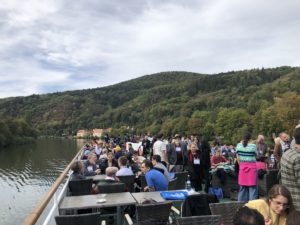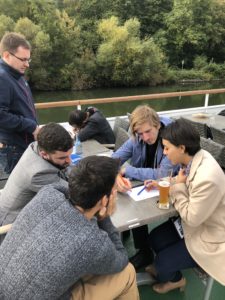What is the most exciting thing in computing in the next 10 years?
BLOG: Heidelberg Laureate Forum
Laureates of mathematics and computer science meet the next generation

 On Wednesday afternoon, HLF got out of the lecture halls and cruise down the Neckar River. I decided to spend my time listening in on conversations and jumping in when I could and asking “what do you think is going to be the most exciting thing in computing in the next 10 years?”
On Wednesday afternoon, HLF got out of the lecture halls and cruise down the Neckar River. I decided to spend my time listening in on conversations and jumping in when I could and asking “what do you think is going to be the most exciting thing in computing in the next 10 years?”
I thought I would get a consensus or at least have duplicated answers, but after talking to a number of different students none of their answers were the same. In fact, some of them didn’t even say that their research would be the most exciting thing in computing in ten years (although a few of them did- can you blame them?).
- Telemedicine– “Telemedicine would be helpful in underdeveloped countries, especially in my country.” (Aline Uwimbabazi, Gran Sasso Science Institute)
- Aline is from Rwanda and is studying distributed systems at the Gran Sasso Science Institute in Italy. She commented to me how wonderful it would be for people in underdeveloped countries to be seen by doctors in developed countries without them having to travel. “It could save so many lives.”
- Digitalization– “Everything will be controlled by machines.” (Arijit Roy, Indian Institute of Technology)
- Arijit is from India and is studying Wireless Sensor Networks (WSNs). When I asked him what he meant, he responded, “literally everything, we will not have to do anything.”
- 5G Networks/IoT– “5G will increase the connectivity of IoT and make it easier to do passive computing” (Tingjun Chen, Columbia University)
- Tingjun is from China and he is interested in system implementation in IoT, optical-wireless networks, mmWave, and 5G networks.
- Programming language “Rust”– “The ability to write programs that do not make mistakes.” (Ralf Jung, Max Planck Institute for Software Systems)
- Ralf is from Germany and he is applying logic for reasoning modularly and proof to “Rust,” “a young safe systems programming language with industrial backing.”
- Blockchain– “Driving the world.” (Olanike Akinduyite, Federal University of Technology in Nigeria)
- Olanike is from Nigeria and she is studying biometric template protection.
- Computing and Data– “Data is life…only God is beyond computing.” (Olutayo Kehinde Boyinbode, Federal University of Technology in Nigeria)
- Olutayo is from Nigeria and she is looking at the “implementation of an adaptive neuro-fuzzy inference ubiquitous learning middleware to support handicapped learners.”
- Assessability of computing internationally– “It is growing but we need to do more.” (Miranda Parker, Georgia Institute of Technology)
- Miranda is American and is trying “to understand what is preventing schools, districts, and states from adopting Computer Science (CS) education.” She argues that “once we understand these barriers, we can better design technology and implement policy to provide computer science for all.”
- SAT solving algorithms and other logistics– “The ability to solve simple problems is key” (Ronald de Haan, University of Amsterdam)
- Ronald is Dutch and is interested in computational complexity, “in particular using the framework of parameterized complexity theory.” Currently, he is investigating “complexity issues for the framework of judgment aggregation.”
Not a bad way to spend a Wednesday afternoon and who knows maybe one or two of them will be correct.


